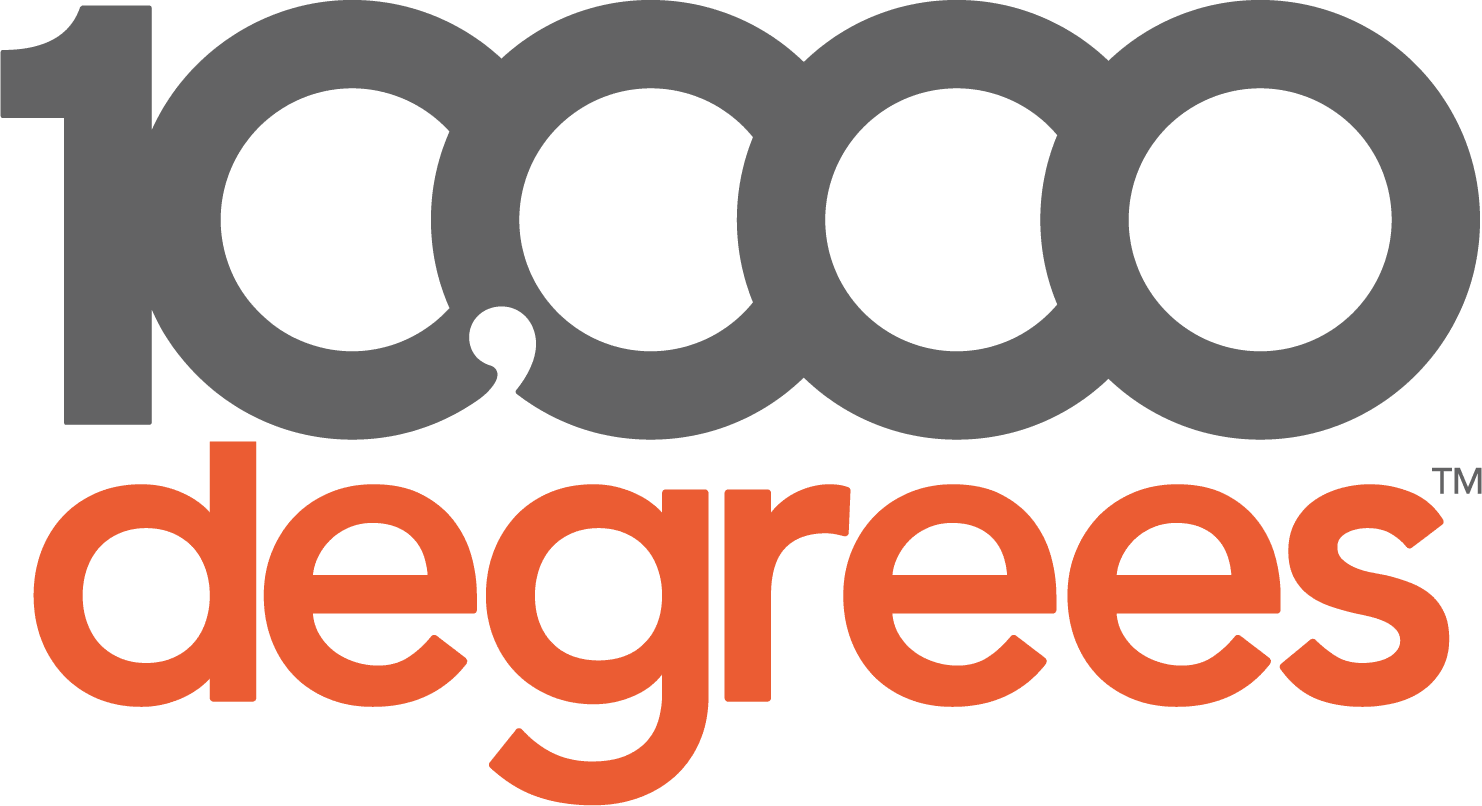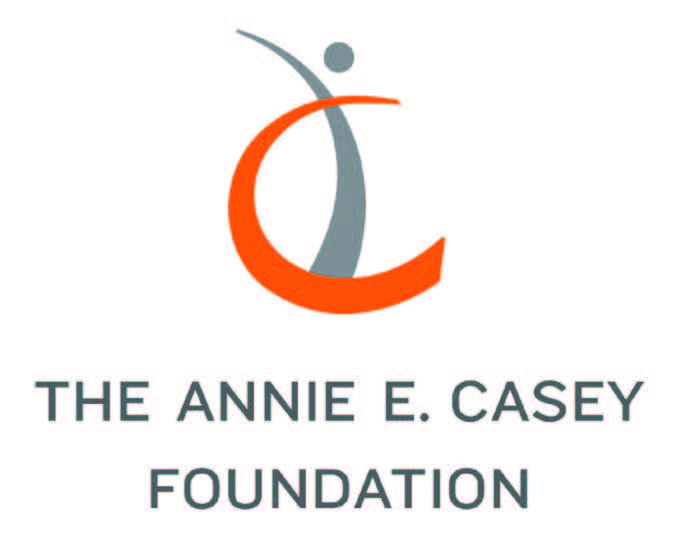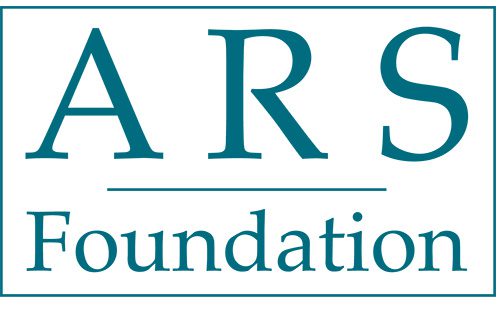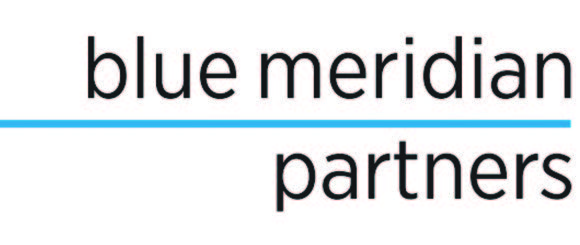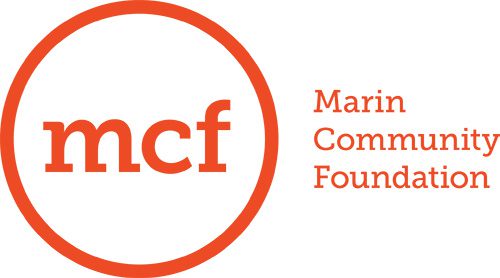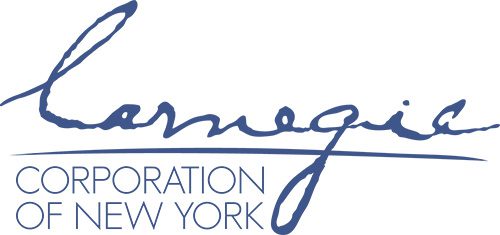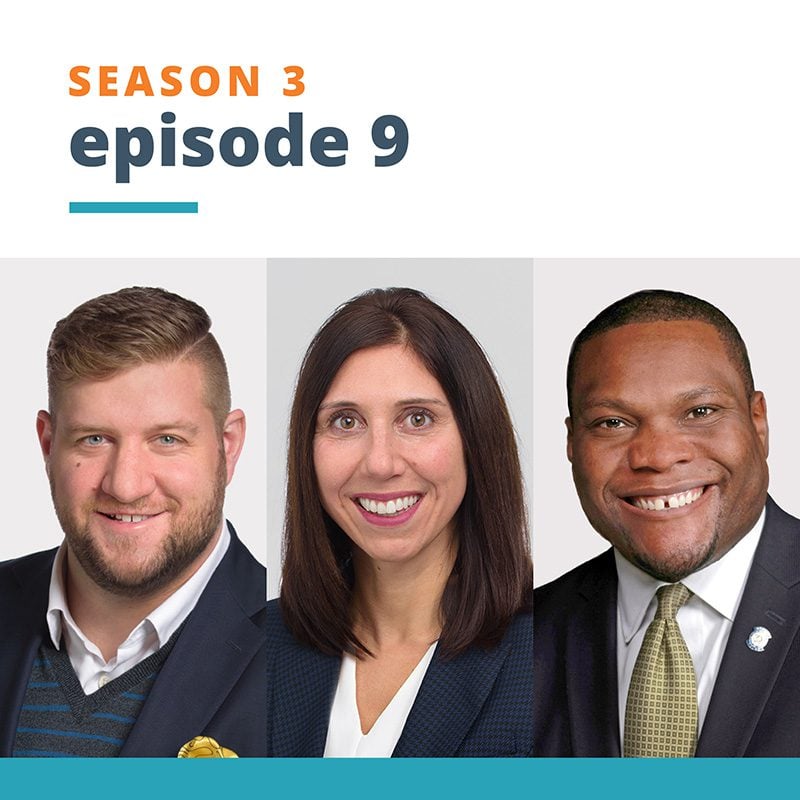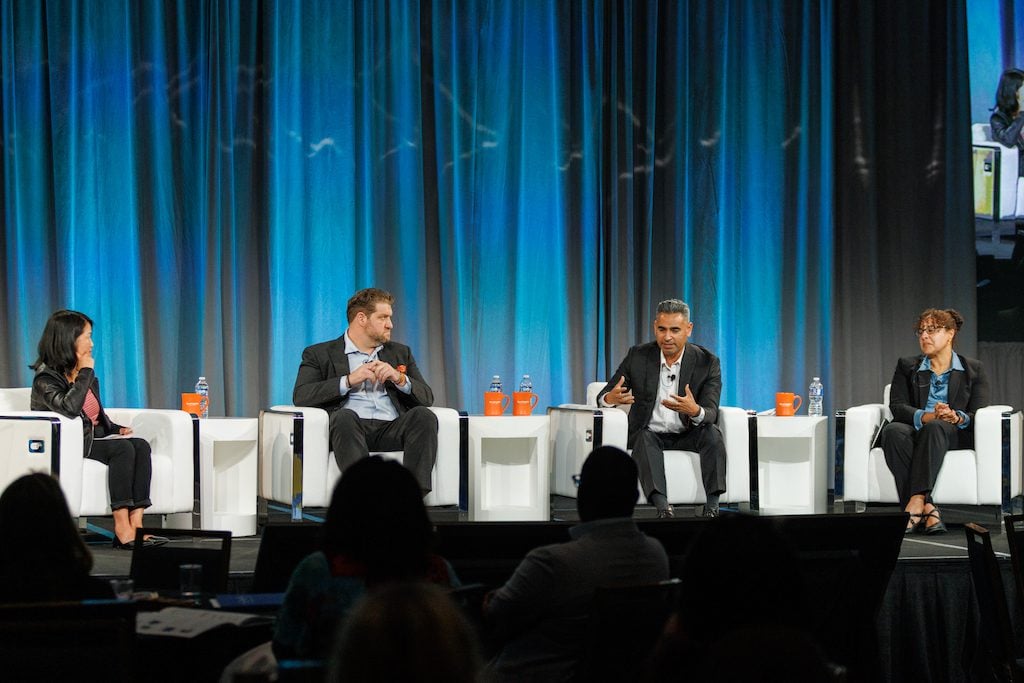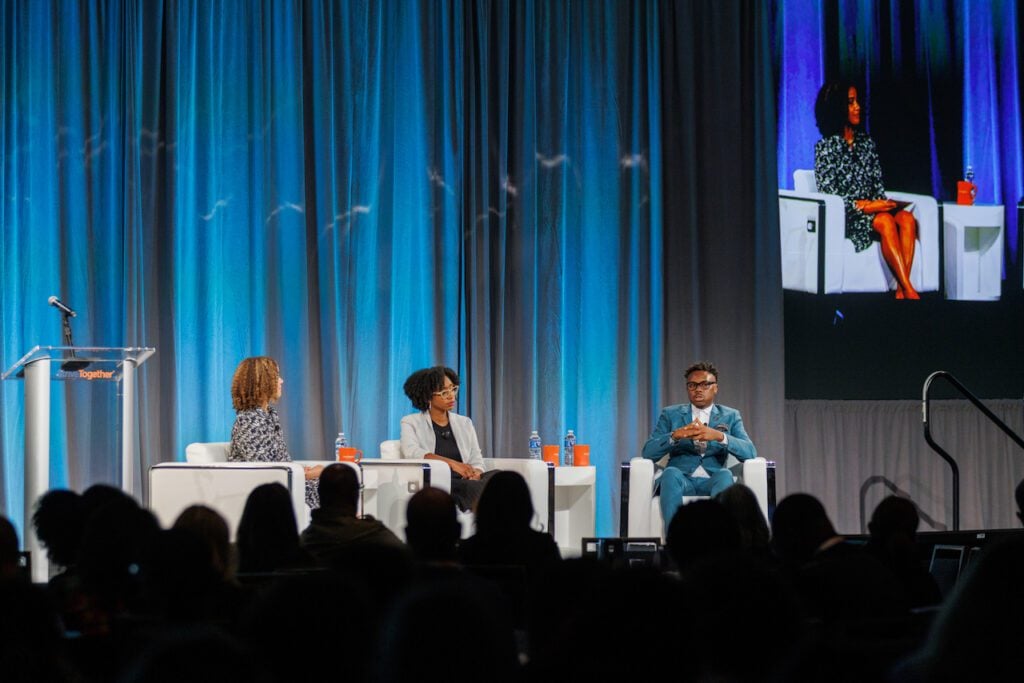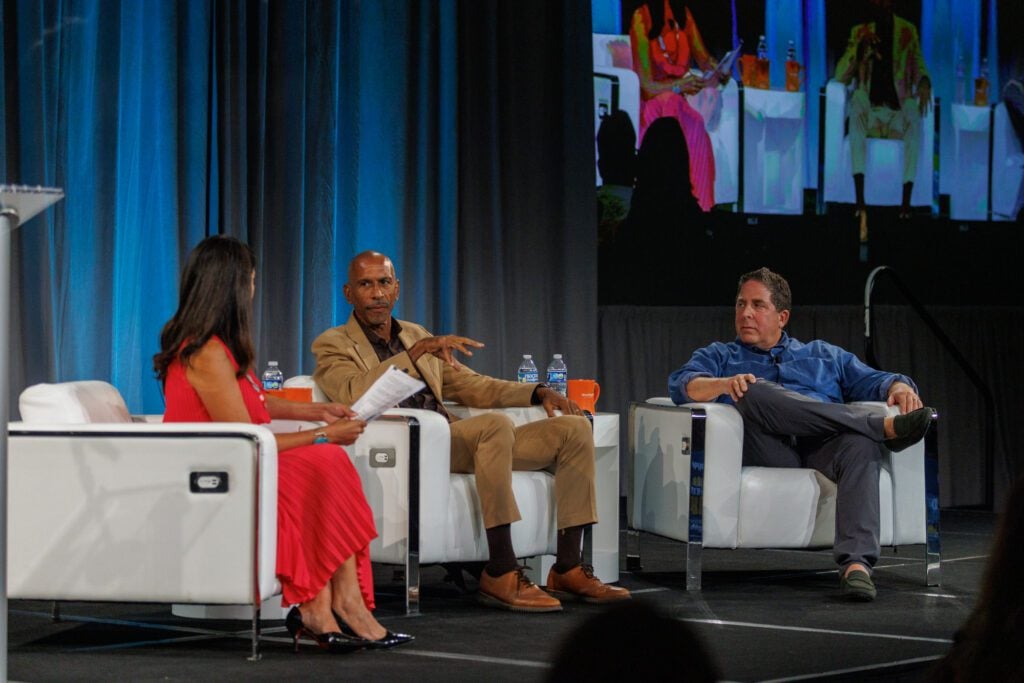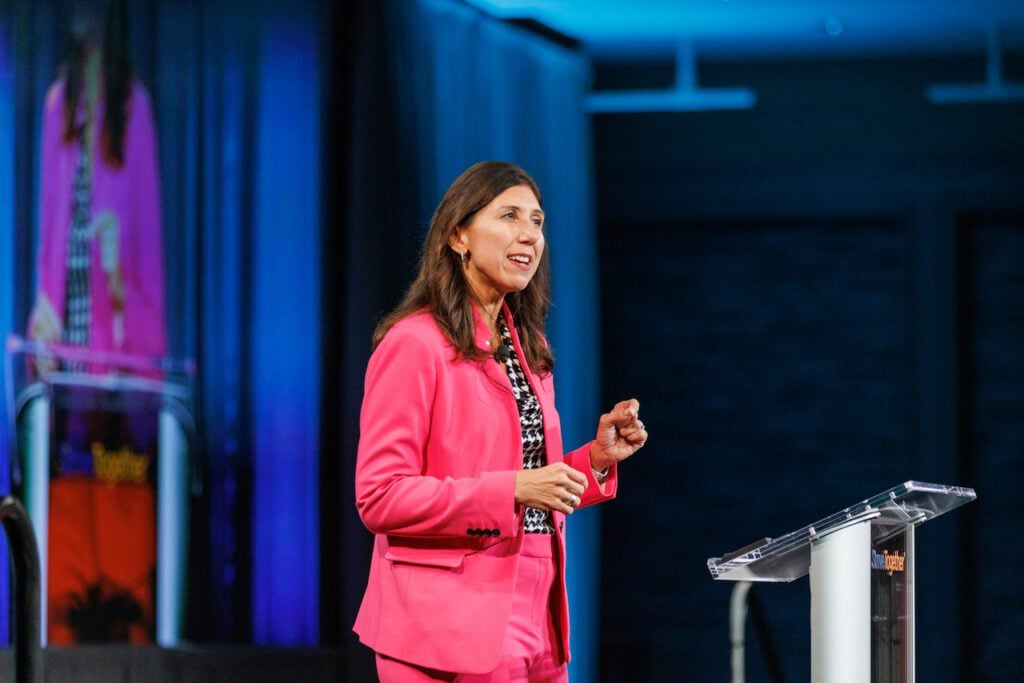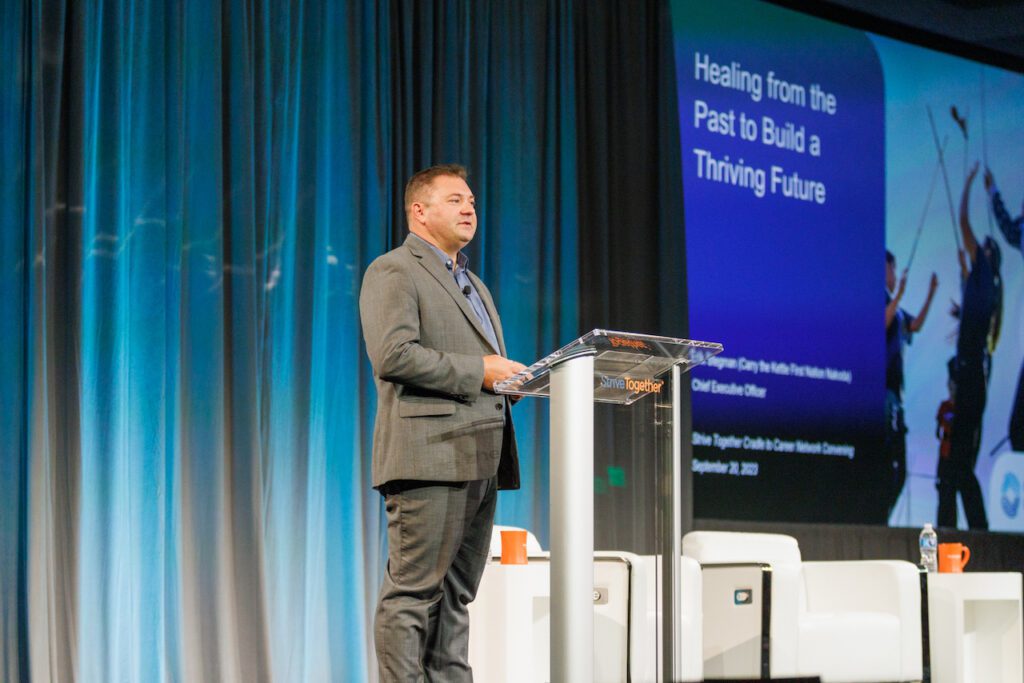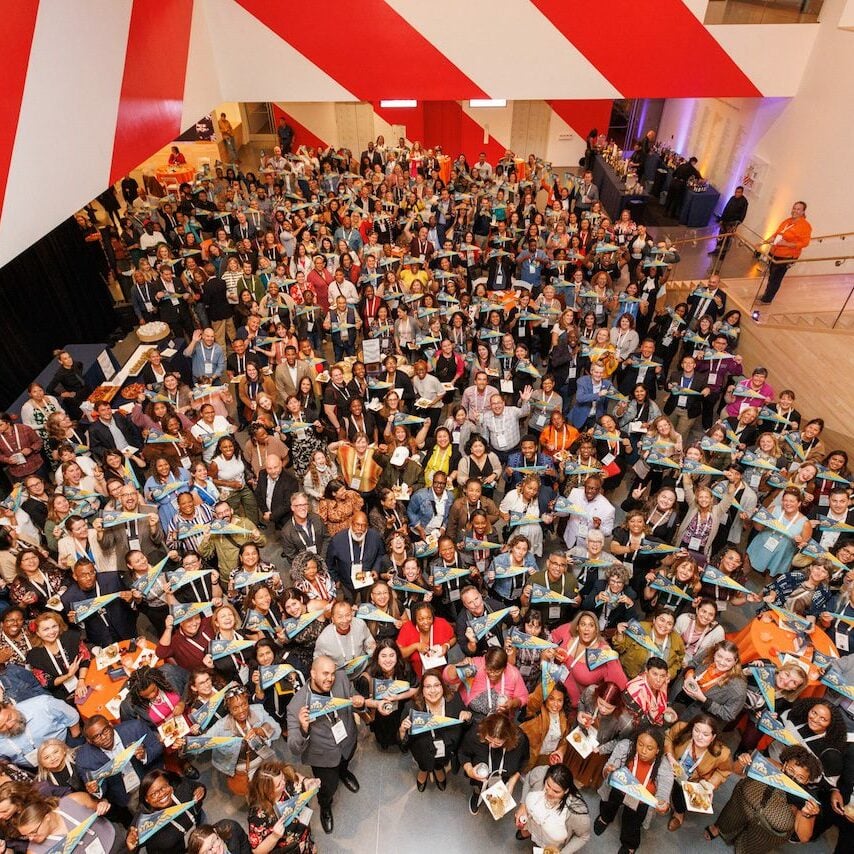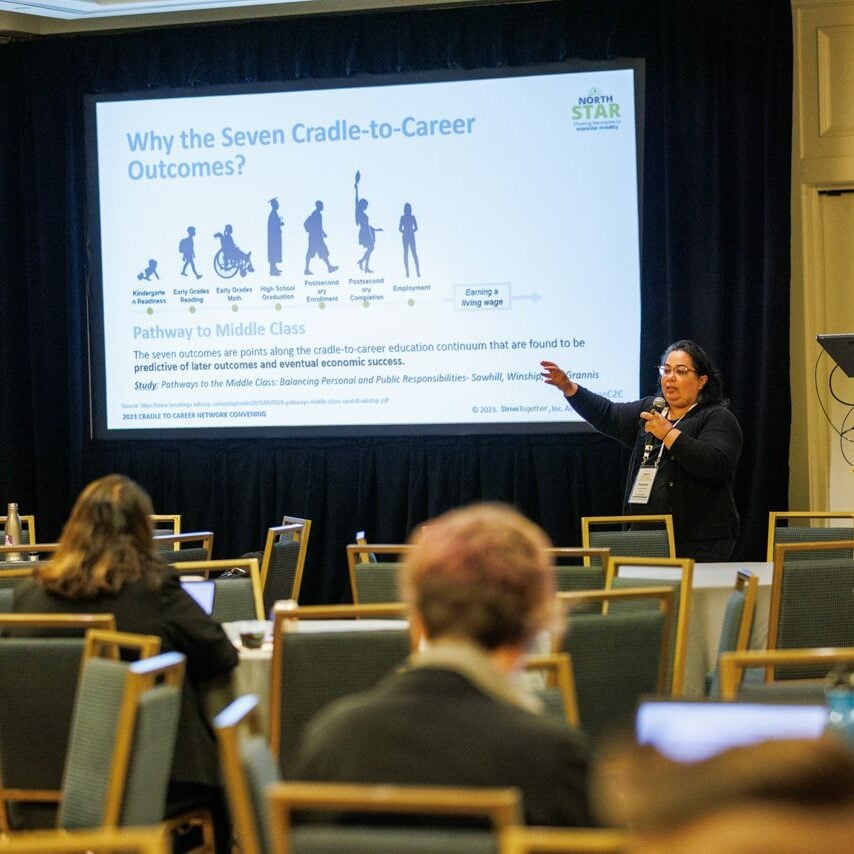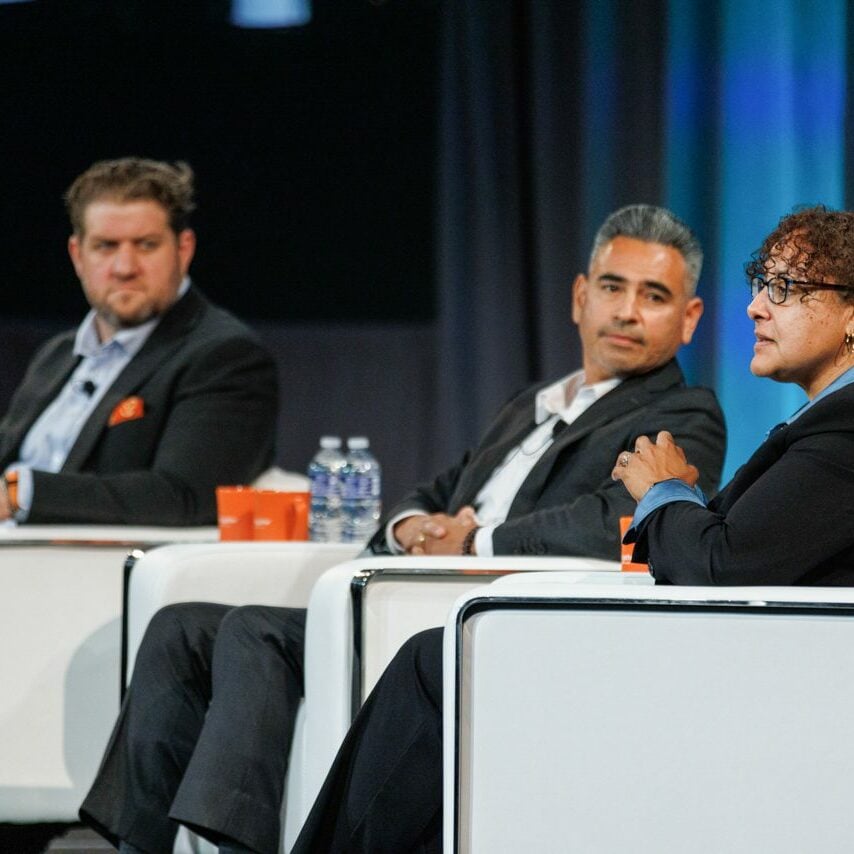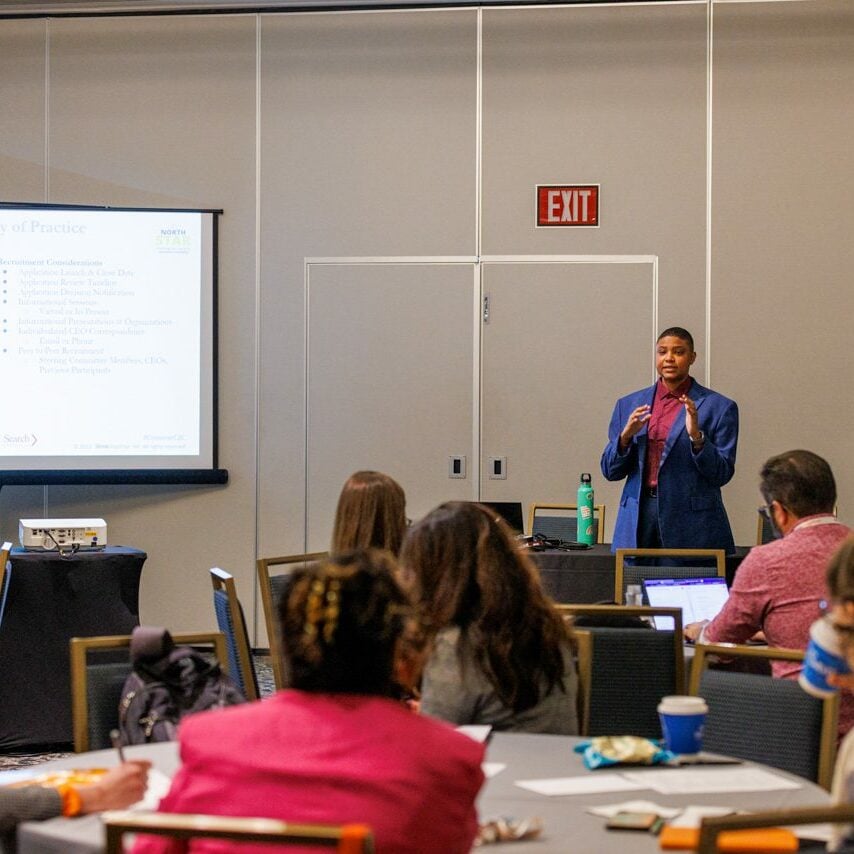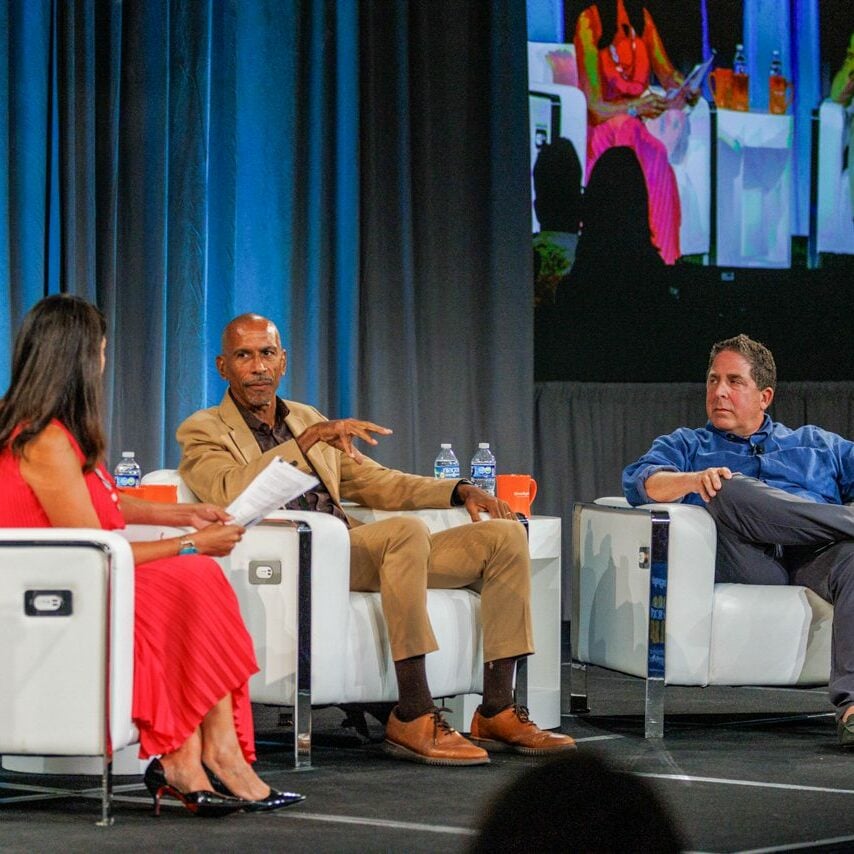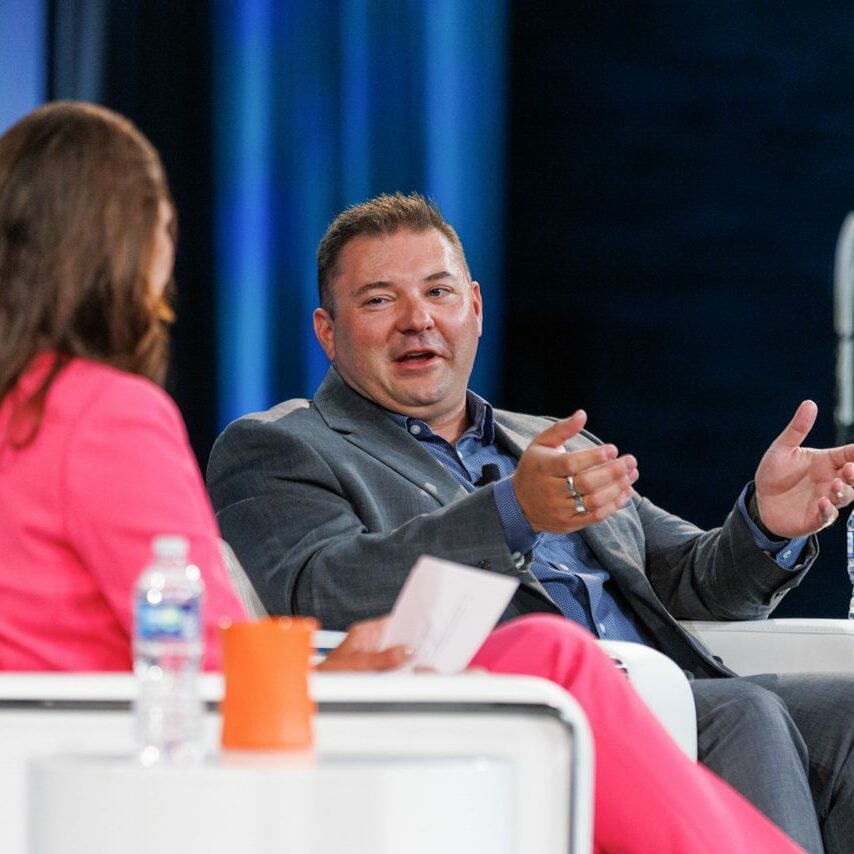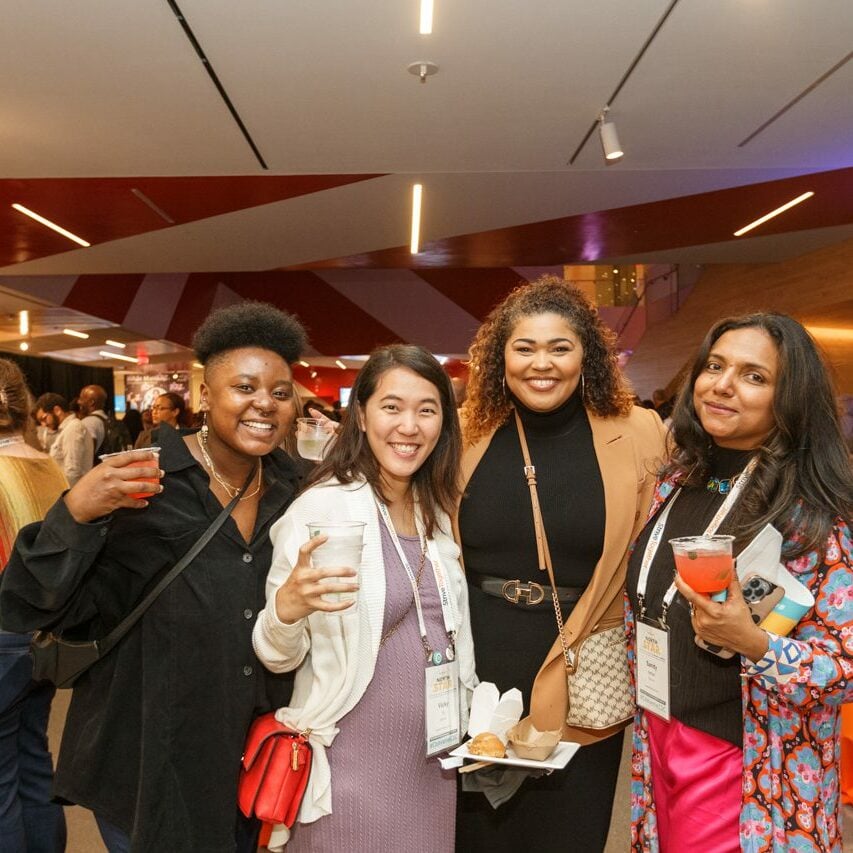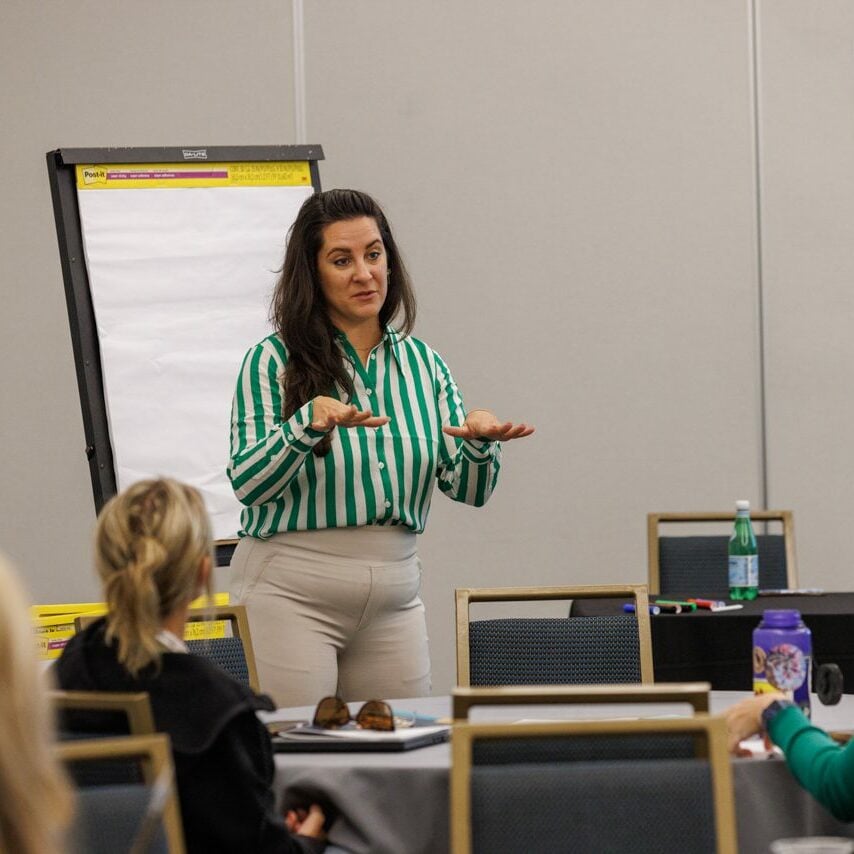Highlights from the 2023 Cradle to Career Network Convening
NORTH STAR
charting the course to economic mobility
More than 600 changemakers gathered for StriveTogether’s annual convening in San Francisco, California, in September. Joined with local and national partners, they shared learning as each works to improve economic mobility for youth in their communities. Economic mobility has been StriveTogether’s North Star since our first convening in 2011.
BUILDING CIVIC INFRASTRUCTURE
from neighborhood to national
“That idea of nested infrastructure gives us an example of this vertical alignment from neighborhood to national.” — Josh Davis, vice president of policy and partnerships
Cradle to Career Network member Mission Promise Neighborhood partners with the community, centering systems on the needs of kids and families to improve cradle-to-career outcomes. Together, they equip and empower young people to reach their full potential.
PLENARY INSIGHTS
voices of inspiration from StriveTogether plenary speakers
“Figure out how to have those community conversations. Bring in as many of those voices as possible that are talking about the direction we’re trying to go.” — Erik Stegman, CEO, Native Americans in Philanthropy
“We know that place-based partnerships are critical infrastructure in our communities. We’ve seen that time and time again.” — Terri Ludwig, Ballmer Group
“Put young people in a position to lead, and they will make this world a better place.” — Jerelyn Rodriguez, co-founder and CEO, The Knowledge House
“A community made up of systems that serve every young person is our dream — and the Cradle To Career Network is going to make it a reality.” — Jennifer Blatz, president and CEO, StriveTogether
INSIGHTS
keynote reflections
NEW NARRATIVE RISING
original piece performed by Kaila Love
The 2023 Cradle to Career Network Convening closed with a spoken word performance from musician and speaker Kaila Love. A Bay Area native, Kaila received her bachelor’s degree in political science from the University of California, Berkeley. She’s performed hundreds of shows, released three EPs and earned an associate degree in recording arts. Download the full poem here.
GETTING BETTER RESULTS FOR EVERY CHILD, CRADLE TO CAREER
bright spots on the pathway to equitable outcomes: lessons from the 2023 Cradle to Career Network Convening
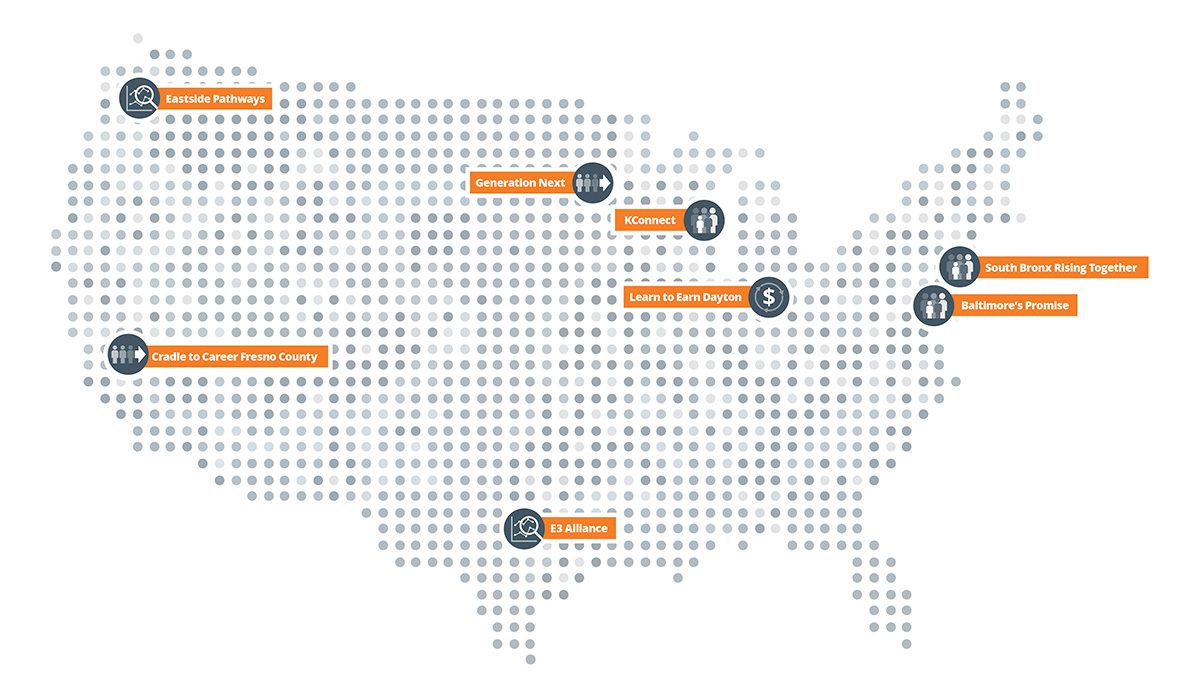
The 2023 Cradle to Career Network Convening brought together partnerships from across the country to share learning. Sessions were designed to advance progress along the StriveTogether Theory of Action™, specifically the shared community vision, evidence-based decision making, collaborative action and investment and sustainability pillars of work. These pillars are the primary components in building and sustaining the civic infrastructure communities need to change systems to improve cradle-to-career outcomes for Black, Indigenous, Latine and Asian youth and youth experiencing poverty. StriveTogether’s seven cradle-to-career outcomes are key milestones on the path to economic mobility.




In New York, South Bronx Rising Together developed a parent/caregiver council made up of 13 parents of young children. In this community-led decision- making body, focus groups were conducted with community members, providers and agencies. They gathered information about challenges in the community and ultimately determined that Bronx children are falling behind in their education due to a lack of adequate social-emotional support for children and their caregivers, which has eroded community trust in the early childhood system. Council members hypothesized that, by rebuilding trust, creating supports and capacity for social-emotional learning and reducing cultural stigma about early intervention services, children will be better prepared to reach the necessary milestones on the path to economic mobility. This also built the foundation of the council’s shared vision to increase the percentage of students meeting these milestones by spring of 2024. To achieve this vision, council members were trained on facilitating community workshops, which grew by word of mouth invitations. The council is now looking to expand to 20 members.
KConnect in Kent County, Michigan collaborated on an award-winning “Normal was Never Enough” communications campaign aimed at educating and empowering the community to take action to address early childhood disparities. Using a collective impact storytelling model, they engaged both people with lived experience (context experts) and people with expertise on subject matter (content experts) to help tell the story of “underlying causes of disparities, local strategies that are effectively attacking racial inequities, and policies that could create lasting and meaningful change.
In Maryland, Baltimore’s Promise is leading a data- driven citywide collaborative to create equitable, high-quality summer learning opportunities for Baltimore youth. Though the Wallace Foundation made a $1 million investment in supporting the creation of a stronger out-of-school time system in Baltimore, there has not been the infrastructure necessary to sustain the momentum year over year.
Baltimore’s Promise activated their network, including the Baltimore City Youth Data Hub and Baltimore Summer Funding Collaborative, to center community decision making in determining priorities and strategies for this initiative. Data from the Hub ensures that community-identified needs are being prioritized through the types of opportunities available, while a community review process led by the Summer Funding Collaborative increases transparency and helps to reduce bias in funding decisions. Thanks to this process, the number of summer learning provider grantees of color has increased from 49% in 2021 to 79% in 2023. The collaborative is now engaging the Hub in data collection to determine whether programs are effective, meeting demand, resourced equitably or reaching those who would benefit from them most.
This data will help inform stronger and more intentional alignment of funding to boost opportunities and infrastructure.
With a shared desire to change outcomes for youth in the foster care system, Cradle to Career Fresno County, the Department of Social Services, the justice system, local educators and community partners used continuous improvement to make progress toward systems change in California. Cross-sector organizers brought together education partners, community partners and content experts, and systems improvement specialists. Together, they formed the networked improvement community (NIC). Members of the NIC held the shared belief that through collective action, they could positively influence student outcomes, especially for those who are disadvantaged and/or disengaged. The NIC honed in on early literacy as the primary factor for improving outcomes for youth in the foster care system, with targeted strategies around improving stability, chronic absenteeism, literacy instruction and care coordination. By coordinating efforts within each organization’s locus of control, the NIC saw significant improvement for its focus population after one year
— 2023 data shows 77% cohort stability (a 7%
improvement), 14% chronic absenteeism (32%
improvement), 23% local literacy (7% improvement),
and 33% state literacy (14% improvement).
In Washington, Eastside Pathways has a north star goal that “100% of high school youth in East King County have the skills and supports needed to thrive to and through their high school into their postsecondary lives.” In working with a broad coalition of partners, they determined that the systems indicators that prevent students from persisting through to postsecondary completion are culturally- responsive curriculum, school climate/discipline and accessible and equitable parental and community governance. Strategies to address those factors included building a “Benchmark of Quality” self- evaluation tool for providers to measure the efficacy of their programs against quality baselines, making youth engagement a part of organizational culture, empowering adults within the system to be experts in assessing and modifying the systems in which they operate, and building a community of practice. By codesigning their Benchmark of Quality tool with a diverse group of stakeholders — including youth and caregivers — and completing multiple Plan-Do-Study- Act cycles, Eastside Pathways is meeting their goals on the pathway to increasing postsecondary persistence. The tool is currently being tested and evaluated by Eastside Pathways partners, with the goal of sharing it out broadly in 2024.
In Texas, a 14-year decline in direct-to-college postsecondary enrollment catalyzed a deep data analysis by E3 Alliance. They sought to determine whether taking dual credit or Career and Technical Education (CTE) courses, receiving Industry-Based Certifications (IBC), and/or participating in Early College High School programs made high school graduates more likely to enroll in postsecondary education and make more than $15 per hour. They determined that students are most likely to complete college — and consequently earn a higher wage — if they are taking 7+ dual credit hours and if they are taking at least one core dual credit course in science, english language arts, math, social studies, language or fine arts. E3 Alliance is now working with partners to increase the number of students taking these courses. Of the 301,795 Texas high school graduates from 2021:
- Over 90,000 students (31%) took at least one dual credit course (up 1% from 2020).
- Over 17,000 students (6%) participated in an Early College High School program.
- 27% of students experiencing poverty took dual credit compared to 38% of students not experiencing poverty (up 1% from 2020).
In Minnesota, Generation Next is working with Saint Paul College and Minneapolis College to embed culturally-sustaining practices into postsecondary experience, especially for Black and Indigenous students, who experience lower levels of persistence in completing their degrees. Their strategies focus on curricular and program design and delivery, comprehensive orientation and first-year experience, and holistic advising and comprehensive student support. Their Bridging the Equity Gap Scholarship Program — which supports Black and Indigenous male students via community, experiential learning, mentorship and leadership — creates a pathway for these students to provide feedback which helps shape the initiative. While the Four Directions Pathway initiative — which aids in the success of American Indian and indigenous students through culturally responsive supports from high school through college
— launched its pilot in 2021 with a cohort 12 of students, it has since grown to support 200 students as they progress from high school through college.
With a focus on recentering power to youth and families, community leaders in Ohio co-created the Northwest Dayton Partnership Community Investment Fund. The fund was able to invest a significant amount of money back into the community. Through a participatory grantmaking process, $1.5 million in funding from Blue Meridian was divided among 28 local organizations, all of which were selected by local residents. Learn to Earn Dayton also invested in Omega CDC in developing the Hope Zone, which seeks to increase outcomes for 6,700 children living in Dayton through defined pathways to self- sufficiency. Residents are driving the Hope Zone work. The partnership was additionally awarded a Promise Neighborhood grant and has identified $90 million in in-kind match contributions.
KEY MOMENTS
join the conversation on social media with #ConveneC2C
AWARD WINNERS
presenting our annual awards at the convening
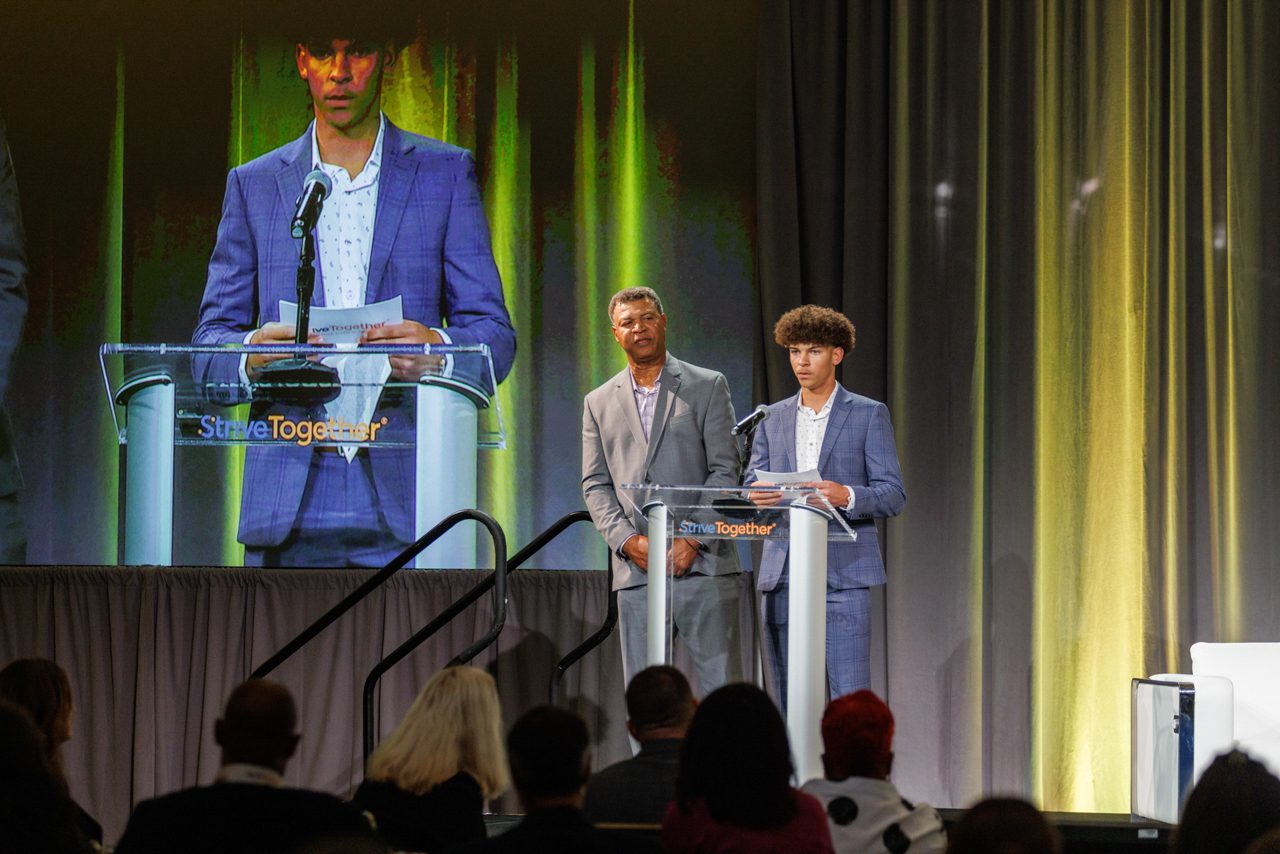
Presenting our annual awards at the convening, StriveTogether honored a cradle-to-career champion, a school district leader and an organization for leading equitable outcomes in their communities.
- Dr. Thomas Lasley II of Learn to Earn Dayton won the Bill Henningsgaard Cradle to Career Champion Award.
- Dr. Silvy Un Lafayette of St. Louis Park Public Schools won the inaugural Cheryl Broadnax Award for Innovation and Results, presented by Cheryl’s husband and son.
- Baltimore’s Promise received the Nancy Zimpher Courage in Leadership Award.

fueling leaders. igniting change.
StriveTogether provides training to help community leaders strengthen their ability to work across sectors, change systems and achieve equitable outcomes. Grounded in proven approaches and tools used by nearly 70 communities in the StriveTogether Cradle to Career Network, the courses and workshops have been tested by national partners.
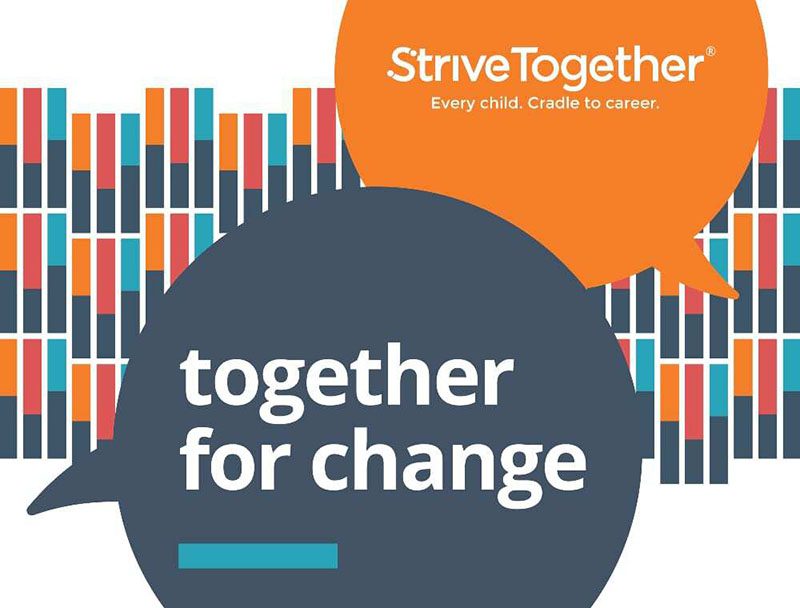
get new insights
Our Together for Change podcast features StriveTogether leaders and our partners from across the country in conversation about breaking down barriers and improving cradle-to-career outcomes.

save the date for Salt Lake City
The 2024 Cradle to Career Network Convening will be held Wednesday to Friday, September 25-27, 2024.
OUR SPONSORS
investing in an equitable future
